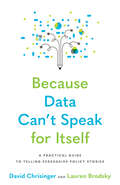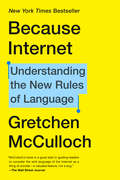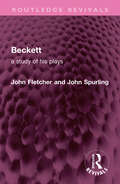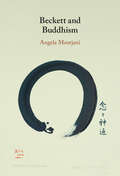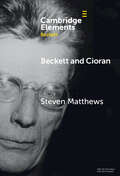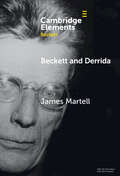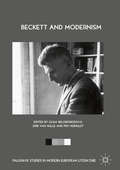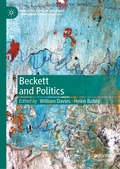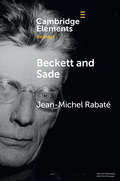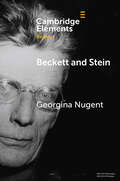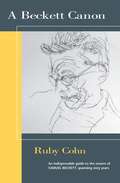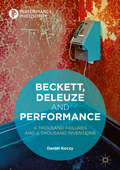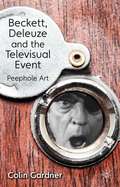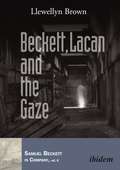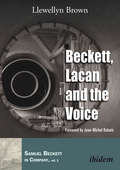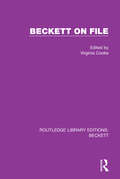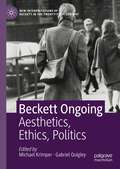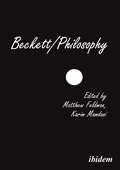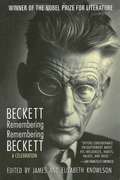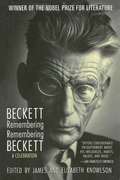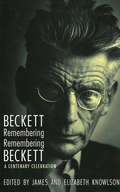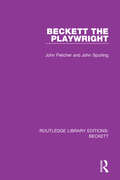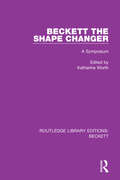- Table View
- List View
Because Data Can't Speak for Itself: A Practical Guide to Telling Persuasive Policy Stories
by David Chrisinger Lauren BrodskyA guide for how to tell clear, data-driven stories that will make an impact.People with important evidence-based ideas often struggle to translate data into stories their readers can relate to and understand. And if leaders can't communicate well to their audience, they will not be able to make important changes in the world. Why do some evidence-based ideas thrive while others die? And how do we improve the chances of worthy ideas? In Because Data Can't Speak for Itself, accomplished educators and writers David Chrisinger and Lauren Brodsky tackle these questions head-on. They reveal the parts and functions of effective data-driven stories and explain myriad ways to turn your data dump into a narrative that can inform, persuade, and inspire action. Chrisinger and Brodsky show that convincing data-driven stories draw their power from the same three traits, which they call people, purpose, and persistence. Writers need to find the real people behind the numbers and share their stories. At the same time, they need to remember their own purpose and be honest about what data says—and, just as importantly, what it does not. Compelling and concise, this fast-paced tour of success stories—and several failures—includes examples on topics such as COVID-19, public diplomacy, and criminal justice. Chrisinger and Brodsky's easy-to-apply tool kit will turn anyone into an effective and persuasive evidence-based writer. Aimed at policy analysts, politicians, journalists, teachers, and business leaders, Because Data Can't Speak for Itself will transform the way you communicate ideas.
Because Internet: Understanding the New Rules of Language
by Gretchen McCullochA Wired Must-Read Book of Summer <P><P>“Gretchen McCulloch is the internet’s favorite linguist, and this book is essential reading. Reading her work is like suddenly being able to see the matrix.” —Jonny Sun, author of everyone's a aliebn when ur a aliebn too <P><P>Because Internet is for anyone who's ever puzzled over how to punctuate a text message or wondered where memes come from. It's the perfect book for understanding how the internet is changing the English language, why that's a good thing, and what our online interactions reveal about who we are. Language is humanity's most spectacular open-source project, and the internet is making our language change faster and in more interesting ways than ever before. <P><P>Internet conversations are structured by the shape of our apps and platforms, from the grammar of status updates to the protocols of comments and @replies. Linguistically inventive online communities spread new slang and jargon with dizzying speed. What's more, social media is a vast laboratory of unedited, unfiltered words where we can watch language evolve in real time.Even the most absurd-looking slang has genuine patterns behind it. <P><P>Internet linguist Gretchen McCulloch explores the deep forces that shape human language and influence the way we communicate with one another. She explains how your first social internet experience influences whether you prefer "LOL" or "lol," why ~sparkly tildes~ succeeded where centuries of proposals for irony punctuation had failed, what emoji have in common with physical gestures, and how the artfully disarrayed language of animal memes like lolcats and doggo made them more likely to spread. <P><P><b> A New York Times Bestseller</b>
Beckett: A Study of his Plays (Routledge Revivals #2)
by John Fletcher John SpurlingFirst published in 1978, Beckett examines the plays of Beckett in the order in which they were written. The book affords a lively and fresh introduction to Beckett’s theatre. Both authors stress that ‘Beckett was waiting for the theatre as the theatre was waiting for Beckett.’ The differing backgrounds of the two authors of this study have enabled them to approach Beckett’s drama in a particularly fruitful way. This book will be of interest to students of literature and drama.
Beckett and Buddhism
by Angela MoorjaniBeckett and Buddhism undertakes a twenty-first-century reassessment of the Buddhist resonances in Samuel Beckett's writing. These reverberations, as Angela Moorjani demonstrates, originated in his early reading of Schopenhauer. Drawing on letters and archives along with recent studies of Buddhist thought and Schopenhauer's knowledge of it, the book charts the Buddhist concepts circling through Beckett's visions of the 'human predicament' in a blend of tears and laughter. Moorjani offers an in-depth elucidation of texts that are shown to intersect with the negative and paradoxical path of the Buddha, which she sets in dialogue with Western thinking. She brings further perspectives from cognitive philosophy and science to bear on creative emptiness, the illusory 'I', and Beckett's probing of the writing process. Readers will benefit from this far-reaching study of one of the most acclaimed writers of the twentieth century who explored uncharted topologies in his fiction, theatre, and poetry.
Beckett and Cioran (Elements in Beckett Studies)
by Steven MatthewsThis Element discusses the association between Samuel Beckett, and the Romanian-born philosopher, E. M. Cioran. It draws upon the known biographical detail, but, more substantially, upon the terms of Beckett's engagement with Cioran's writings, from the 1950s to the 1970s. Certain of Cioran's key conceptualisations, such as that of the 'meteque', and his version of philosophical scepticism, resonate with aspects of Beckett's writing as it evolved beyond the 'siege in the room'. More particularly, aspects of Cioran's conclusion about the formal nature that philosophy must assume chime with some of the formal decisions taken by Beckett in the mid-late prose. Through close reading of some of Beckett's key works such as Texts for Nothing and How It Is, and through consideration of Beckett's choices when translating between English and French, the issues of identity and understanding shared by these two settlers in Paris are mutually illuminated.
Beckett and Derrida (Elements in Beckett Studies)
by James MartellUncannily similar projects, Beckett's and Derrida's oeuvres have been linked by literary and philosophy scholars since the 1990s. Taking into consideration their shared historical and personal contexts as writers whose main language of expression was 'adopted' or 'imposed', this Element proposes a systematic reading of their main points of connection. Focusing on their engagement with the intricacies of beginnings and origins, on genetic grounds or surfaces analogous to the Platonic khôra, and on their similar critiques of the aporias of sovereignty, it exposes the reasons why multiple readers, like Coetzee, consider Derridean deconstruction a philosophical mirror of Beckett's literary achievements.
Beckett and Modernism: The Extended Mind And Creative Undoing From Darwin To Beckett And Beyond (Palgrave Studies in Modern European Literature #1)
by Olga Beloborodova Dirk Van Hulle Pim VerhulstThis book of collected essays approaches Beckett’s work through the context of modernism, while situating it in the literary tradition at large. It builds on current debates aiming to redefine ‘modernism’ in connection to concepts such as ‘late modernism’ or ‘postmodernism’. Instead of definitively re-categorizing Beckett under any of these labels, the essays use his diverse oeuvre – encompassing poetry, criticism, prose, theatre, radio and film – as a case study to investigate and reassess the concept of ‘modernism after postmodernism’ in all its complexity, covering a broad range of topics spanning Beckett’s entire career. In addition to more thematic essays about art, history, politics, psychology and philosophy, the collection places his work in relation to that of other modernists such as T. S. Eliot, James Joyce, Wyndham Lewis, Gertrude Stein and Virginia Woolf, as well as to the literary canon in general. It represents an important contribution to both Beckett studies and modernism studies.
Beckett and Politics: Politics, Propaganda And A 'universe Become Provisional' (New Directions in Irish and Irish American Literature)
by William Davies Helen BaileyThis collection of essays reveals the extent to which politics is fundamental to our understanding of Samuel Beckett’s life and writing. Bringing together internationally established and emerging scholars, Beckett and Politics considers Beckett’s work as it relates to three broad areas of political discourse: language politics, biopolitics and geopolitics. Through a range of critical approaches, including performance studies, political theory, gender theory, historicizing approaches and language theory, the book demonstrates how politics is more than just another thematic lens: it is fundamentally and structurally intrinsic to Beckett’s life, his texts and subsequent interpretations of them. This important collection of essays demonstrates that Beckett’s work is not only ripe for political engagement, but also contains significant opportunities for understanding and illuminating the broader relationships between literature, culture and politics.
Beckett and Sade (Elements in Beckett Studies)
by Jean-Michel RabatéMuch has been written on Beckett and Sade, yet nothing systematic has been produced. This Element is systematic by adopting a chronological order, which is necessary given the complexity of Beckett's varying assessments of Sade. Beckett mentioned Sade early in his career, with Proust as a first guide. His other sources were Guillaume Apollinaire and Mario Praz's book, La Carne, La morte e il Diavolo Nella Letteratura Romantica (1930), from which he took notes about sadism for his Dream Notebook. Dante's meditation on the absurdity of justice provides closure facing Beckett's wonder at the pervasive presence of sadism in humans.
Beckett and Stein (Elements in Beckett Studies)
by Georgina NugentWhat motivated Beckett, in 1937, to distance himself from the 'most recent work' of his mentor James Joyce, and instead praise the writings of Gertrude Stein as better reflecting his 'very desirable literature of the non-word'? This Element conducts the first extended comparative study of Stein's role in the development of Beckett's aesthetics. In doing so it redresses the major critical lacuna that is Stein's role and influence on Beckett's nascent bilingual aesthetics of the late 1930s. It argues for Stein's influence on the aesthetics of language Beckett developed throughout the 1930s, and on the overall evolution of his bilingual English writings, arguing that Stein's writing was itself inherently bilingual. It forwards the technique of renarration – a form of repetition identifiable in the work of both authors – as a deliberate narrative strategy adopted by both authors to actualise the desired semantic tearing concordant with their aesthetic praxes in English.
A Beckett Canon
by Ruby CohnSamuel Beckett is unique in literature. Born and educated in Ireland, he lived most of his life in Paris. His literary output was rendered in either English or French, and he often translated one to the other, but there is disagreement about the contents of his bilingual corpus. A Beckett Canon by renowned theater scholar Ruby Cohn offers an invaluable guide to the entire corpus, commenting on Beckett's work in its original language. Beginning in 1929 with Beckett's earliest work, the book examines the variety of genres in which he worked: poems, short stories, novels, plays, radio pieces, teleplays, reviews, and criticism. Cohn grapples with the difficulties in Beckett's work, including the opaque erudition of the early English verse and fiction, and the searching depths and syntactical ellipsis of the late works. Specialist and nonspecialist readers will find A Beckett Canon valuable for its remarkable inclusiveness. Cohn has examined the holdings of all of the major Beckett depositories, and is thus able to highlight neglected manuscripts and correct occasional errors in their listings. Intended as a resource to accompany the reading of Beckett's writing--in English or French, published or unpublished, in part or as a whole--the book offers context, information, and interpretation of the work of one of the last century's most important writers.
Beckett, Deleuze and Performance: A Thousand Failures and A Thousand Inventions (Performance Philosophy)
by Daniel KoczyThis book draws on the theatrical thinking of Samuel Beckett and the philosophy of Gilles Deleuze to propose a method for research undertaken at the borders of performance and philosophy. Exploring how Beckett fabricates encounters with the impossible and the unthinkable in performance, it asks how philosophy can approach what cannot be thought while honouring and preserving its alterity. Employing its method, it creates a series of encounters between aspects of Beckett’s theatrical practice and a range of concepts drawn from Deleuze’s philosophy. Through the force of these encounters, a new range of concepts is invented. These provide novel ways of thinking affect and the body in performance; the possibility of theatrical automation; and the importance of failure and invention in our attempts to respond to performance encounters. Further, this book includes new approaches to Beckett’s later theatrical work and provides an overview of Deleuze’s conception of philosophical practice as an ongoing struggle to think with immanence.
Beckett, Deleuze and the Televisual Event
by Colin GardnerAn expressive dialogue between Deleuze's philosophical writings on cinema and Beckett's innovative film and television work, the book explores the relationship between the birth of the event - itself a simultaneous invention and erasure - and Beckett's attempts to create an incommensurable space within the interstices of language as a (W)hole.
Beckett, Lacan and the Gaze (Samuel Beckett in Company #6)
by Llewellyn BrownForming a pair with the voice, the gaze is a central structuring element of Samuel Beckett’s creation. And yet it takes the form of a strangely impersonal visual dimension testifying to the absence of an original exchange of gazes capable of founding personal identity and opening up the world to desire. The collapse of conventional reality and the highlighting of seeing devices—eyes, mirrors, windows—point to the absence of a unified representation. While masks and closed spaces show the visible to be opaque and devoid of any beyond, light and darkness, spectres—manifestations without origin—reveal a realm beyond the confines of identity, where nothing provides a mediation with the seen, or sets it within perspective. Finally, Beckett’s use of the audio-visual media deepens his exploration of the irreducibly real part of existence that escapes seeing.This study systematically examines these essential aspects of the visual in Beckett’s creation. The theoretical elaborations of Jacques Lacan—in relation with corresponding developments in the history and philosophy of the visual arts—offer an indispensible framework to understand the imaginary not as representation, but as rooted in the fundamental opacity of existence.
Beckett, Lacan, and the Voice (Samuel Beckett in Company #1)
by Llewellyn BrownThe voice traverses Beckett's work in its entirety, defining its space and its structure. Emanating from an indeterminate source situated outside the narrators and characters, while permeating the very words they utter, it proves to be incessant. It can alternatively be violently intrusive, or embody a calming presence. Literary creation will be charged with transforming the mortification it inflicts into a vivifying relationship to language. In the exploration undertaken here, Lacanian psychoanalysis offers the means to approach the voice's multiple and fundamentally paradoxical facets with regards to language that founds the subject's vital relation to existence. Far from seeking to impose a rigid and purely abstract framework, this study aims to highlight the singularity and complexity of Beckett's work, and to outline a potentially vast field of investigation.
Beckett, Lacan, and the Voice
by Llewellyn Brown Jean-Michel RabatéThe voice traverses Beckett's work in its entirety, defining its space and its structure. Emanating from an indeterminate source situated outside the narrators and characters, while permeating the very words they utter, it proves to be incessant. It can alternatively be violently intrusive, or embody a calming presence. Literary creation will be charged with transforming the mortification it inflicts into a vivifying relationship to language. In the exploration undertaken here, Lacanian psychoanalysis offers the means to approach the voice's multiple and fundamentally paradoxical facets with regards to language that founds the subject's vital relation to existence. Far from seeking to impose a rigid and purely abstract framework, this study aims to highlight the singularity and complexity of Beckett's work, and to outline a potentially vast field of investigation.
Beckett, Modernism and the Material Imagination
by Steven ConnorSteven Connor, one of the most influential critics of twentieth-century literature and culture, has spent much of his career writing and thinking about Samuel Beckett. This book presents Connor's finest published work on Beckett alongside fresh essays that explore how Beckett has shaped major themes in modernism and twentieth-century literature. Through discussions of sport, nausea, slowness, flies, the radio switch, religion and academic life, Connor shows how Beckett's writing is characteristic of a distinctively mundane or worldly modernism, arguing that it is well-attuned to our current concern with the stressed relations between the human and natural worlds. Through Connor's analysis, Beckett's prose, poetry and dramatic works animate a modernism profoundly concerned with life, worldly existence and the idea of the world as such. Lucid, provocative, wide-ranging, and richly informed by critical and cultural theory, this book is required reading for anyone teaching or studying Beckett, modernism and twentieth-century literary studies.
Beckett on File (Routledge Library Editions: Beckett #1)
by Virginia CookeThis book, first published in 1985, assembles essential facts on Samuel Beckett and makes vital but elusive information available. It contains a comprehensive checklist of all the writer’s plays, with a detailed performance history, excerpted reviews, and most importantly, a selection of Beckett’s own comments on their work drawn from essays, interviews, letters and diaries. Other features include a chronology of life and work, a checklist of non-dramatic writings and an annotated bibliography.
Beckett Ongoing: Aesthetics, Ethics, Politics (New Interpretations of Beckett in the Twenty-First Century)
by Michael Krimper Gabriel Quigley“You must go on. I can’t go on. I’ll go on.” These are some of the most quoted lines written by Samuel Beckett, which speak to the impulse of persevering in times of crisis and impossibility. Yet few readers of Beckett agree about what this paradoxical formula could mean, let alone what mode of engagement it would seem to indicate, be it committed, autonomous, or something else entirely. This volume of essays explores what that mode of engagement could be, all the while elucidating the ethical and political stakes of the “ongoing” in both Beckett’s life and work. Across multiple disciplines in the humanities, the authors delve into questions of political subjectivity and representation, the ethics of powerlessness and refusal, the aesthetics of syncopation and destitution, multimedia experiments between genre, as well as Beckett’s wider impact on transnational itineraries of modernism and philosophy up to the contemporary.
Beckett/Philosophy: A Collection
by Matthew Feldman Karim Mamdani"Beckett criticism has been greatly enhanced, and sometimes chastened, by genetic scholarship, as this anthology... attests."—Andre Furlani, Modernism/Modernity"This collection of essays... represents the most comprehensive analysis of Beckett's relationship to philosophy in print, how philosophical issues, conundrums, and themes play out amid narrative intricacies. The volume is thus both an astonishingly comprehensive overview and a series of detailed readings of the intersection between philosophical texts and Samuel Beckett's oeuvre, offered by a plurality of voices and bookended by an historical introduction and a thematic conclusion."—S. E. Gontarski, Journal of Beckett Studies"Helps us to consider not only how Beckett made use of philosophy but how his own thought might be understood philosophically."—Anthony Uhlmann, University of Western Sydney
Beckett Remembering/Remembering Beckett
by Samuel Beckett Elizabeth Knowlson James KnowlsonIn life, Beckett was notoriously reticent, preferring to let his work speak for itself. In the first half of this collection, he reveals many of his inner thoughts and honest opinions about his life, writing, friends, and colleagues in candid interviews published for the first time in this book. He discusses his friendship with James Joyce and his role in the Resistance during the Nazi occupation of France. Also included are newly discovered photographs of Beckett--as a young boy, as a teacher, as best man at a friend's wedding, and with painter Henri Hayden.In the second half, friends and colleagues share their memories of Beckett as a schoolboy, a teacher, a struggling young writer, and a sudden success in 1953 with the appearance of Waiting for Godot. Readers will be enchanted by the poignant remembrances by those who knew him best, worked with him most closely, or admired him for his enduring influence: including actors Hume Cronyn, Jean Martin, Jessica Tandy, and Billie Whitelaw and fellow playwrights and authors Edward Albee, Paul Auster, E. M. Cioran, J. M. Coetzee, Eugène Ionesco, Edna O'Brien, and Tom Stoppard.
Beckett Remembering/Remembering Beckett: A Celebration
by Samuel Beckett James Knowlson Elizabeth KnowlsonIn life, Beckett was notoriously reticent, preferring to let his work speak for itself. In the first half of this collection, he reveals many of his inner thoughts and honest opinions about his life, writing, friends, and colleagues in candid interviews published for the first time in this book. He discusses his friendship with James Joyce and his role in the Resistance during the Nazi occupation of France. Also included are newly discovered photographs of Beckett-as a young boy, as a teacher, as best man at a friend’s wedding, and with painter Henri Hayden.In the second half, friends and colleagues share their memories of Beckett as a schoolboy, a teacher, a struggling young writer, and a sudden success in 1953 with the appearance of Waiting for Godot. Readers will be enchanted by the poignant remembrances by those who knew him best, worked with him most closely, or admired him for his enduring influence: including actors Hume Cronyn, Jean Martin, Jessica Tandy, and Billie Whitelaw and fellow playwrights and authors Edward Albee, Paul Auster, E. M. Cioran, J. M. Coetzee, Eugène Ionesco, Edna O’Brien, and Tom Stoppard.
Beckett Remembering / Remembering Beckett
by James KnowlsonThis revealing collection offers fresh insights into one of the 20th century's greatest, most enigmatic writers. In life, Samuel Beckett was one of the most private of men, preferring to let his writing speak for itself. In this commemorative volume, through interviews with his official biographer, he speaks of his youth, his home and family, his schools in Dublin, his life in Paris as an exchange student from Trinity College Dublin, his early writings, and his war years in the south of France. The second part of the work includes dozens of pieces written about him by those who knew him best, worked with him most closely, or admired him for his enduring influence, among them Edward Albee, Paul Auster, J. M. Coetzee, Hume Cronyn, Eugène Ionesco, Anthony Minghella, Tom Stoppard, and Jessica Tandy. Of special interest are remembrances of Beckett as a young man from fellow students at Trinity College Dublin and from L'Ecole Normale Supérieure in Paris. For those familiar with Beckett's work, this will enhance their knowledge; for those who are not, it is a revealing introduction to the Nobel Prize-winning author's life and work.
Beckett the Playwright (Routledge Library Editions: Beckett #2)
by John Fletcher John SpurlingThis book, first published in 1985, stresses Beckett’s success as an innovator in the theatre through a close reading and analysis of his plays. The differing backgrounds of the two authors enables them to approach Beckett’s drama in a particularly fruitful way: ‘Their analysis is clever yet level-headed, readable but does not shirk complexities.’ (Times Educational Supplement). ‘Brilliant collection of essays on Beckett and his works.’ (Irish Times)
Beckett the Shape Changer: A Symposium (Routledge Library Editions: Beckett #3)
by Katharine WorthThe essays in this book, first published in 1975, suggest how best to approach Beckett, how to read him, how to get closer to the concrete experience offered by this most concrete of writers. It aims to bring out the full diversity of Beckett’s art as dramatist and story-teller. His astonishing flexibility and inventiveness is stressed throughout, either in studies of single novels, or from the whole range of the fiction and stage drama, or from the experiments in other media: the solitary film, the radio plays. Beckett’s bilingualism, one of the strangest aspects of his Proteanism, is examined through a comparison of the French and English texts of some of his stage plays. The emphasis of the essays is literary rather than philosophical: they explore narrative and dramatic processes, the strange partial transitions between them, the fine relations of form and feeling which Beckett aims at through whatever medium he is using, and his humaneness, expressed through the many nuances of his humour. The shorter fiction and the later writings also receive close attention.
